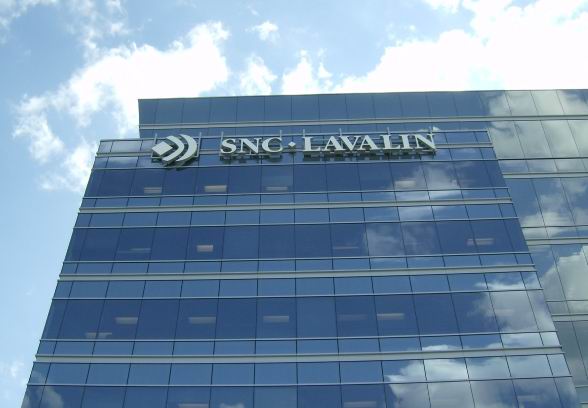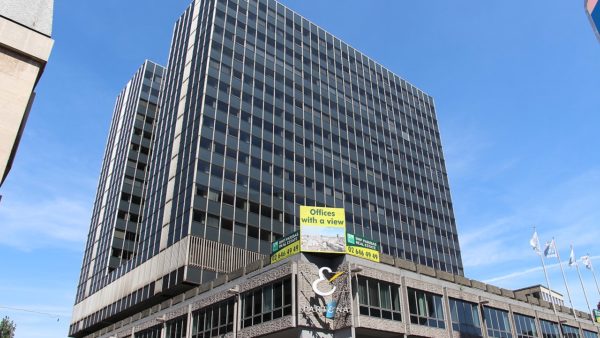The corruption scandal engulfing the engineering giant might have been avoided if Canada hadn’t lagged behind the rest of the world in its anti-corruption policies, says Canada’s head of Transparency International.
Janet Keeping describes her first thought as she watched a man board her train in Calgary wearing a jacket emblazoned with the logo of the Canadian engineering giant, SNC-Lavalin.
“I thought, isn’t that a tragedy – the first thought that comes to mind is the corruption scandal.”
She spoke not just as head of the Canadian office of the global anti-corruption watchdog, Transparency International (TI), but also as a Canadian.
That’s because until recently, SNC-Lavalin, the 102-year-old engineering firm active all over the world, was a household name Canadians could be proud of.
But now it’s ensnared in a corruption scandal that seemingly won’t stop sprouting tentacles.
“It’s sad, because SNC-Lavalin is the largest Canadian firm of its kind,” she says, “so for us to have to endure this unfolding scandal and saga is pretty shocking.”
Putting her TI hat on, however, Ms Keeping told GCR that one part of the problem is Canada’s anti-corruption law, which, as a criminal statute, requires a higher standard of proof than is required in other countries, notably America.
This makes prosecutions difficult.
But a much bigger part of the problem is Canada’s historical laxity in laying down the law against its companies’ corrupt practices abroad.
The SNC-Lavalin scandal might even have been avoided, she says, if Canada hadn’t lagged behind the rest of the developed world in clamping down on foreign bribery.
Â
Way back in 1997
The Organisation of Economic Co-operation and Development (OECD) launched its anti-bribery convention in 1997, requiring signatories to pass laws against bribing foreign public officials.
In response, Canada passed its Corruption of Foreign Public Officials Act (CFPOA) in 1999.
But for the next 10 years it did little to enforce it.
Only in 2008 did Canada’s national Royal Canadian Mounted Police create a special office, the International Anti-Corruption Unit (IACU), to target corporate offenders.

SNC-Lavalin is involved in multiple fraud investigations
It’s not a big operation. The IACU has two units, one in the capital, Ottawa, and the other nearly 3,000 km away in Calgary.
Each has just seven officers, according to Ms Keeping.
The IACU’s first major CFPOA prosecution, against oil and gas company Niko Resources Ltd., took place in 2011, resulting in a CAN$9.5m fine.
But in the long period before this, Canada came under fire from the OECD for being so lax.
“Canada was certainly held out to be a laggard,” says Ms Keeping. “We were pointed to as a country that was simply not doing much.”
In September 2012, TI noted Canada’s belated efforts, naming it one of three “most improved” corruption fighters that year.
But by then things had already started coming apart for SNC-Lavalin.
In February that year its share price plummeted on the revelation that it couldn’t account for millions in payments.
After that its CEO at the time, Pierre Duhaime, was arrested and now faces multiple fraud-related charges. Its former vice president of construction is in a Swiss prison on corruption charges relating to Libya. Two other dismissed executives have filed lawsuits against SNC-Lavalin, claiming they’ve been treated as scapegoats amid allegations of bribery.
The list goes on. Investigations are now underway in at least three countries, including the company’s home turf, Quebec.
As Ms Keeping says: “With SNC, it’s one fiasco after the other. We haven’t seen the end of this.”
Â
International context
Part of the problem, she says, is that Canada’s anti-corruption law, the CFPOA, is less effective than American anti-corruption law.
That’s because it is a purely criminal statute, requiring a very high standard of proof for convictions.
This makes prosecuting instances of foreign corruption difficult because such cases are inevitably complex.
“The Americans have administrative laws and offences, called books and records offences,” she says. “It’s one thing to prove the bribery. That can be really hard. But it can be easier to prove that the books were cooked to cover up what was probably an illicit payment.
“The Americans have that not just on the criminal law side of things but on the securities law side of things. So you don’t have the same burden of proof.”
In February 2013 the Canadian government tabled amendments to strengthen the CFPOA to include a books and records offence. Ms Keeping said that, if passed, the amendments would help – a bit.
“It will be a separate criminal offence, to try to cover up the payment of a bribe. But it will still be a criminal offence. It will be easier to prove, maybe, than the underlying corruption, but we still have to prove it to a criminal standard of proof, which is tougher.”
She said Canada can’t copy America’s approach exactly without constitutional change. “Constitutionally our federal government has only criminal law power in this area, different from the Americans,” she said.
Canada should also learn from the UK Bribery Act, Ms. Keeping says, because it allows a defence whereby if the company has done everything it possibly could to prevent corrupt transactions, it may not be held liable – although individuals might.

Janet Keeping
Soft on crime
But the real failure, she says, has been Canada’s soft attitude to corruption abroad.
With its small domestic market, Canada encouraged businesses to go global in the 1990s, Ms Keeping says, but without any corresponding focus on ethics, or even the country’s own law.
She saw this as director of Russia programs for the Canadian Institute of Resources Law at the University of Calgary, in which capacity she spent a lot of time in Russia with business people, Canadian and Russian, after CFPOA was passed in 1999.
“At not one single meeting, and I attended lots of them, where Canada-Russia business issues were discussed, did anyone mention the existence of that legislation,” she said.
“People talked about corrupt Russian business practices, but the fact that you as a Canadian and your company being involved there could actually be liable under Canadian law to a criminal penalty including possible imprisonment – it was not mentioned once, even when the events were run by the [Canadian] federal government.
“That’s a shocking fact. It means tonnes of people had no idea that the law was even in force.”
Ms Keeping believes it meant that an “anything goes” attitude was allowed to persist. “The earlier we as a country had enforced the law and worked hard on education that the law exists and that it’s going to be taken seriously – the earlier we started, the better it would have been.”
Â
Immense damage
SNC-Lavalin’s travails have certainly brought the issue to the fore in Canada. Ms Keeping says that according to a “reliable source”, the entire IACU Ottawa unit is now occupied with SNC-Lavalin, and that it has contracted extra specialists to help.
SNC-Lavalin has responded decisively, shedding staff and hiring new board members, including a former ethics expert from Siemens, and a new CEO.
But the fear, expressed by Ms Keeping, is that it’s too late.
“When things go as wrong as they have for SNC-Lavalin, it’s not just your criminal law problems that are going to occupy you. A tonne of other things go wrong,” she said, “a tonne of other things.”
“The damage to reputation – it’s not just outside the company, it’s inside the company. We, TI Canada, have had conversations initiated by SNC-Lavalin people, just individuals, about how awful this is.
“The damage that has been done to SNC-Lavalin is immense, and it’s very sad, because it is an important company in Canada, and it’s just shameful what has been allowed to happen.”






